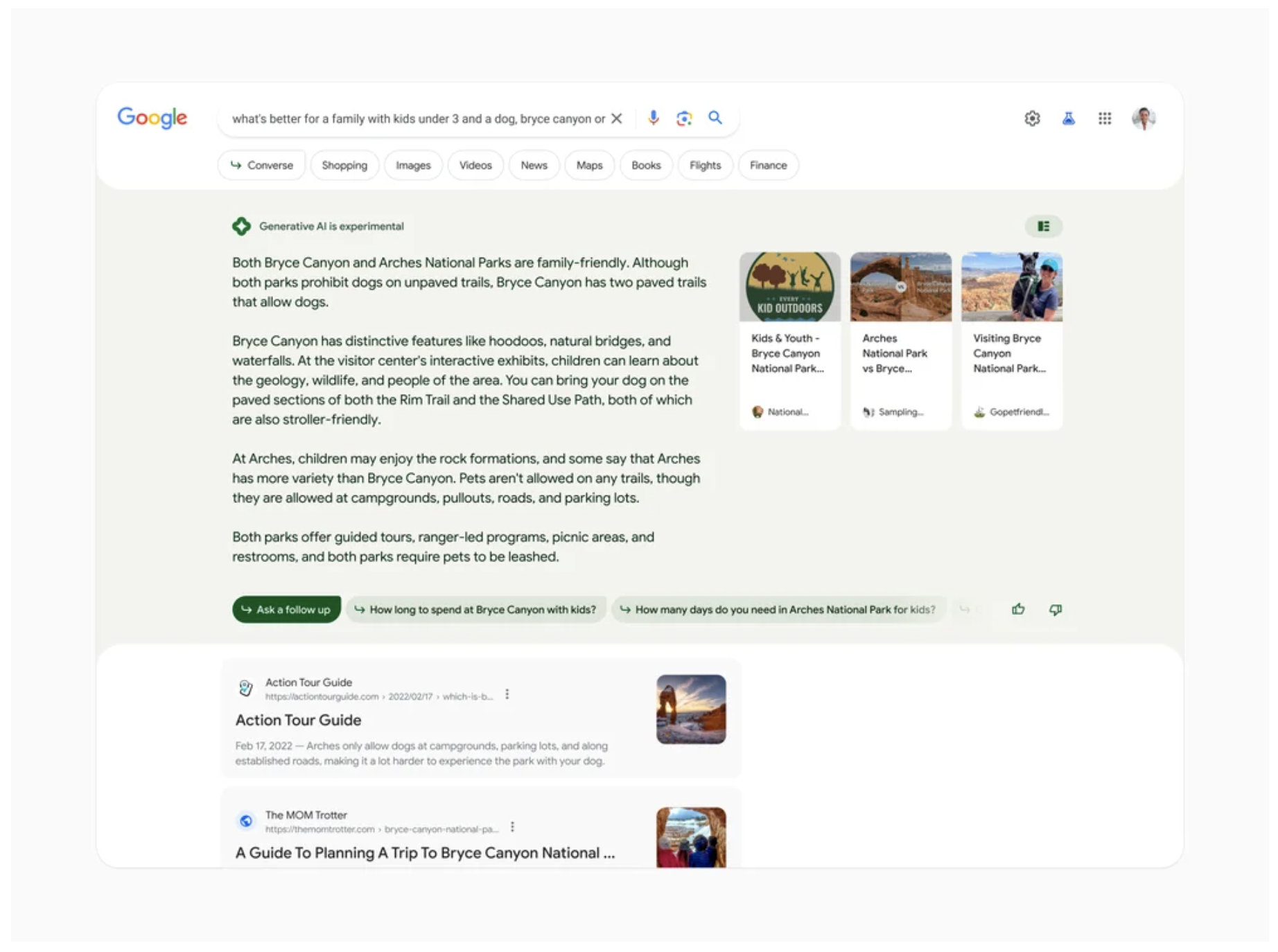SEO is about to change forever—and for the better

Our initial thoughts after testing Google’s new Search Generative Experience.
The SEO industry has been ripe for disruption—and disruption is coming. Since the dawn of search there have been SEO agencies touting “#1 rankings” and exploiting algorithm loopholes with “black hat” SEO tactics. As the general marketer became more familiar with SEO and search engines improved their ranking algorithms, the industry has evolved for the better. The best SEO agencies are talking about SEO revenue more than SEO rankings , and quality content more than keywords. At Google’s I/O conference in May of this year, the search behemoth brought that evolution to a head.
Enter: Search Generative Experience (SGE). A result of the breakthroughs in AI (including products like OpenAI’s ChatGPT and Google’s Bard), Google has shared a glimpse into the future of their search product. This new experience means answers to complex search queries can be addressed directly on the search results page, including follow-up prompts and a variety of other AI-generated features.

Source: blog.google.com
What it means for search
Similar to the introduction of the featured snippet (but on a much larger scale), this new experience can mean less traffic to websites from organic search. The impact from Featured Snippets was confined primarily to informational queries—but SGE may be much broader.
Known impacts will be to informational queries and queries with No One Right Answer (NORA). However, AI results may also extend into local results, shopping results, and even the paid search landscape. As a beta tester of Google’s test-run for SGE, we can confirm that most of our test queries were impacted in some way, and with a multitude of AI-generated SERP features.
Why this is good news for SEO
As long as marketers have been investing in SEO, there have been searches for “is SEO dead.” The short answer: no, but it will be different.
-
People will still search
The beauty of AI is that it relies on web content to deliver accurate responses. Leveraging generative AI in search results opens up a beautiful paradox for Google—how do you reward content creators while simultaneously cutting into their ability to drive traffic to their websites?
People will still search the web for answers. And search engines will still rely on subject experts to create meaningful and relevant content to meet those needs. Historically, the reward system for content creation was traffic to websites. It’s now on Google to develop a new reward system for content creators—and it will subsequently be the task of SEO professionals to understand this new reward system and how to leverage it to benefit current and prospective customers.
- SEO KPIs will evolve—and SEO professionals will be more accountable for results
Have you ever purchased a fake knock-off of a popular expensive fashion brand? I once bought ‘totally legitimate Jordan sandals’ for just $14 from a (only semi-) sketchy website. They looked great and I showed them off—until they fell apart a couple weeks later.
Rankings are the fake knock-off brand of primary SEO KPIs. It’s great to show your boss and colleagues that you’re ranking number 1, right up until you realize your investment in SEO isn’t actually driving any value (traffic, leads or revenue) to the business. That’s not to say ranking data isn’t a useful input for SEO measurement, but it should never be the primary KPI.
Generative AI results will do away with the agencies selling fake Jordan sandals. Rankings as a vanity metric will be be less meaningful as #1 spots are taken over by AI—and real primary KPIs like revenue, conversions, and quality non-brand traffic will take their place.
- SEO will be less of a commodity
As KPIs will get more complex, agencies will be more accountable, and SEO delivery will be more holistic and sophisticated (and less task-oriented). SEO agencies selling monthly blog posts as part of an “SEO package” will be laid to rest.
The best SEO strategies have impact beyond just SEO, and therefore have to leverage marketing channels and inputs outside of search. This level of strategy doesn’t often come cheap, and cheap strategies rarely drive results. If you’re leveraging an SEO checklist for your “strategy,” investing in SEO based on the number of keywords you want to rank for, or you’re looking to spend $500/month on SEO in a new world of SGE, you’re better off spending your time and money elsewhere.
- The traffic you do get from organic search will be higher quality
Google’s objective, even with AI results, will continue to be getting people the right information they need– especially when that information leads to a purchase. That purchasing experience, more often than not, will continue to rely on information from a company website.
Google’s Bard results are now citing websites (similar to Bing chat). This means that, even in AI results, a user can quickly and easily visit a website. There may be fewer visits to websites as users get answers directly in search, but those who do visit websites will generally do so with a greater purchase intent.
- SEO strategies will have to focus more on users, and less on search engines
This is a big one. Similar to the pending departure from rankings as a KPI, SEO professionals will have to start thinking less like a search engine and more like their target customer.
The industry has been trending toward this evolution– but AI search results will expedite the shift. The SEO industry has always been wary of Google algorithm updates because these updates are commonly aimed at “patching” the loopholes that SEOs have tried to exploit. AI results will be the last nail in the coffin of those looking to game the algorithms.
The new era in search aims to prioritize authentic, useful, relevant content experiences– not those crafted for the sole purpose of SEO rankings. AI results are likely going to be baked with the same philosophy– but with a greater capability for understanding (and learning) what content works and what content doesn’t.
The Unknowns
It’s important to keep in mind that the thoughts above are still mere predictions, and generative AI as a public tool is still very much in its infancy. Much has changed since February when the data was published, but at the time a YouGov study indicated that 54% of Americans were still unfamiliar with ChatGPT, and only 6% had tried it (source). We can’t forget that ChatGPT was released in November ‘22, followed quickly by products from Bing and Google.
Now, only 6 months later, Google is setting the stage for what many believe to be the future of search– still with many lingering unknowns. As of late May 2023, SGE has started to become available to those who have signed up for the testing trial. You can sign up here, but, similar to Bard, it’s only available to personal accounts (not business accounts).
Measurement
The biggest open question for many SEOs is how will AI results be measured. Brands will likely see significant declines in overall organic traffic with SGE—but also increases in new engagements from AI results, such as clicks on website citations. Bing has announced plans to bring click and impression data from Bing Chat to Bing Webmaster Tools, but no similar position has been shared by Google regarding SGE at the time of writing. Unfortunately, until this new experience launches, all we can do is speculate on the impact it will have and how that impact can be measured.
Scale
As mentioned above, it’s unclear exactly what types of queries will be impacted and to what extent. Informational queries/NORA queries are most likely to be heavily impacted, but the total impact is at Google’s discretion. As with most SERP features, Google will make the determination of what queries deserve AI results (when they believe AI will produce more useful results than ‘traditional’ SERPs). And the prevalence of generative AI results may change over time. Google originally claimed that queries dealing with Your Money or Your Life (YMYL– such as financial decisions or medical topics) would be less impacted by AI results. However, our initial tests with SGE indicate results for medical and financial searches are revealing AI responses.
Timing
Google has indicated that SGE is mostly an “experiment,” but that they have long-term plans to use the experiment to craft a new world of online search. The timeline for this plan is undetermined– which means marketers likely have time to prepare, test, learn, and hopefully receive more information from Google on how to adapt for the new world. The rollout may take 2 months, 2 years, or never happen– it’s entirely in Google’s court.
Adoption
Even in a world where AI populates the vast majority of SERP real estate on a wide breadth of queries, we don’t know for sure that the average online searcher won’t simply scroll past these results in favor of the traditional blue organic links. This may be a short-term roadblock for Google, as they have a history of pushing their products to quick adoption. That said, the results in SGE take 5+ seconds to generate– so a user could just as easily bypass the entire experience.
Where to Start
With all the unknowns, possibilities, and speculation it’s difficult to determine the best place to launch into the world of AI search. We recommend starting by making sure you understand your target customer and how they interact with search results.
Then, sign up for Bard, take SGE for a test-run, play with ChatGPT, and try Bing Chat. These are the tools and features that will lay the foundation for the future of AI in search results. Understand how they work, and start to think about how they might play a role in your target customer’s journey.
Long-term, the same framework used today for SEO will likely apply. Know your customer, know what they search for, understand the search features that are present, develop SEO goals and an optimization plan, implement changes, measure and report– and repeat the process. Some of these steps will be more impacted by AI than others, but the end-goal of attracting customers to your site via search will be the same.

